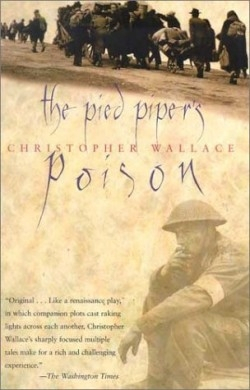The Pied Piper's Poison
A naive young Scottish doctor is assigned by the Allied army to a Russian-guarded refugee camp during World War II. No one seems to know why, but refugees are dying of a grotesque illness. The Russians are at a loss. Can the doctor figure out the cause and do something to stop the plague?
An interesting beginning, one that promises a story of mystery and heroism. When the scene in the camp is tied to a scene nearly three hundred years earlier, of the German town of Hamelin, struggling to survive the Thirty Years War and overwhelmed by rats, an army camped at its gates and a strange Piper wandering its streets, the book also becomes an intriguing search for historical patterns and connections.
Wallace, who lives in Edinburgh, has written a first novel with an ambitious theme. His portrait of a sincere young man who becomes progressively confused and frustrated about the problem he faces is believable. Hamelin also comes alive in Wallace’s hand. He has done extensive research on life in the seventeenth century and his portrait of a town in panic is chilling.
Wallace’s theme is challenging: Is there an innate poison in human nature that causes such immense tragedies as war? Tackling such a subject requires looking deeply into the darker reaches of people’s hearts, and Wallace occasionally mines these depths. Ironically, though, the character into which is seen the most clearly is the doctor himself, who is a kind and generous person. Stylistically, there is the occasional confusing jump from past to present tense, or from a first-person point of view to a universal one, but these faults are not major.
In the end, one is left asking a question: Is mankind redeemable? In an age where so many books deal with the surface of life, it is refreshing to read someone who is willing to jump into the muck of life with both feet and explore one of the most basic questions of human existence. Wallace has created a fascinating story as a vehicle to carry his ideas.
Reviewed by
Keith Collins
Disclosure: This article is not an endorsement, but a review. The publisher of this book provided free copies of the book to have their book reviewed by a professional reviewer. No fee was paid by the publisher for this review. Foreword Reviews only recommends books that we love. Foreword Magazine, Inc. is disclosing this in accordance with the Federal Trade Commission’s 16 CFR, Part 255.

